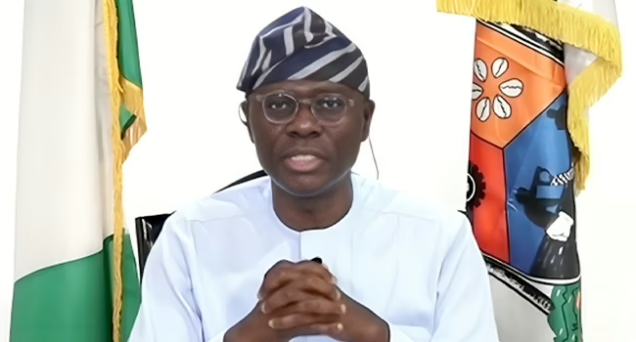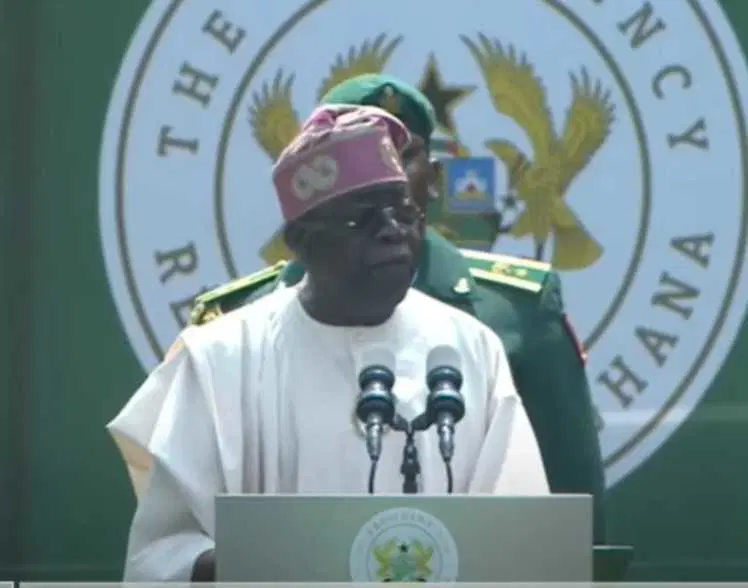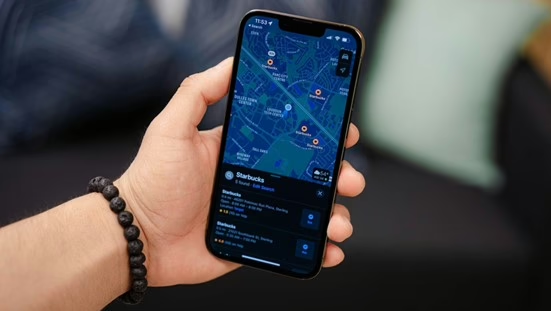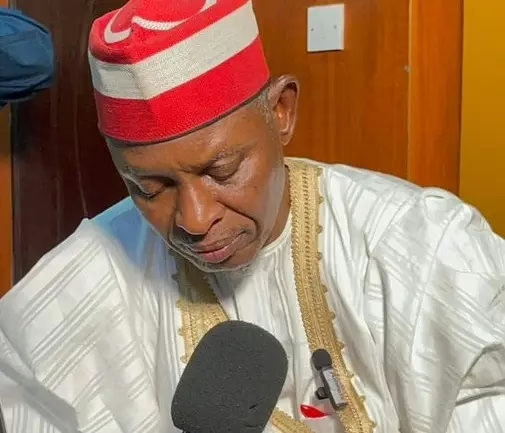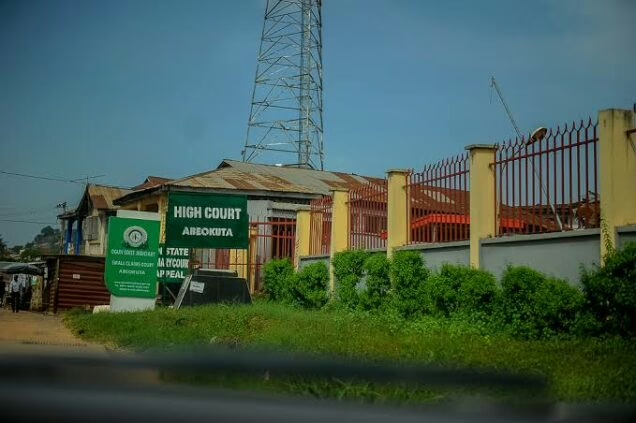Interview: Why we haven’t begun work on Fourth Mainland Bridge – Sanwo-Olu
Gov. Babajide Sanwo-Olu
Published By: Kazeem Ugbodaga Lagos State Governor, Mr. Babajide Sanwo-Olu, during an interview on TVC’s Breakfast Show on Transforming Lagos State, broadcast on Monday, speaks on infrastructural projects, local government autonomy, forthcoming council elections, and the Tax Reform Bill, among other issues
We have been speaking about some of the things happening in Lagos and how you have been ensuring the transformation that you have promised for Lagos State. Let us hear from you directly.
Thank you for having me, and I want to say Happy New Year to all of you. You have a wonderful space here. This is the real Lagos. You have probably just shown that there is a possibility if you put your mind to it. Coming into your premises this morning and then walking straight into the studio speaks volumes. You know, what the new Lagos looks like. It seems to me that TVC is in tandem with Lagos State looking at our own aspiration. It is really for us to use all of the learnings and all of the issues of 2024 to shape our 2025 in governance, how we prepare citizens, how we give them opportunities and how we are able to use the toughness of 2024. You know, the resilience, the very hard economic reality that we needed to face as a nation and as a sub-national. But to be able to transit properly into the new year and be able to tap into its benefits. I am sure you have been talking about all of the things that happened last year towards the end of it, all of the activities. Lagos being the economic capital of the country, which we know but now more being the entertainment capital clearly shows that it is a diaspora population. Not only from Nigeria, but the whole of sub-Saharan Africa.
Talking about the ‘Dirty December” as it was last year when we saw a lot of persons, the inflow of traffic, especially those who just returned, and how they had fun in Lagos as against some other states that we used to know. How does the State intend to harness these opportunities to boost the Internally Generated Revenue moving forward?
For us, it is really not just about the revenue; it is about the socio-economic development that they will bring about for the citizen. It is for us to be able to calendarize. And for everybody—the local population, the diaspora population, and the international audience—to be able to plan, predict, and be able to say to themselves that from October, these are the calendarized events and activities that will happen in Lagos, Nigeria.
In November, these are the activities that I am interested in: fashion, arts, the creative industry, the digital economy, book fairs, regattas, masquerade events, entertainment shows, and the rest of it. So that people will plan, and once you have people properly planned out, then people can make all of their travel arrangements and booking arrangements. We also need to stimulate that with investing. How well do we get the private sector to make more investment into real estate, especially into the hospitality business; more restaurants, hotel accommodation, and conversions to accommodate. How well also do we now prepare the city for security, safety, public transportation, for us to be able to have a seamless movement of people in and out of it. When we do all of that, what you will see which happens in other parts of the world, is that you can have an economy that will be on for six weeks, and that economy will keep that country for the next 12 months. There are parts of the world where during the summer, they open for three months or two months, and the proceeds and sales they make during that time is enough for the next nine months. Those are the kind of things that we can do so that it will generate a lot more employment; you can get 50,000 to 100,000 new employees that they will have a sustainable means for two, three months, and it will be sufficiently grounded enough to keep them for another six, eight months. That is the kind of jigsaw that we need to put together.
We don’t know it all, so what we are thinking through is that this month, we would be setting up different levels of committee with the private sector, government agencies, operators, and professionals in all of the verticals that I have mentioned, and we all develop a calendarized work plan that we all identify: who does what, who increases what, and where does government fit in in all of this. Ours is to be an enabler and to be able to provide the opportunity for the private sector to thrive, grow, and their businesses. We just want to create that enabling environment and push back. That is the plan.
Lagos has shown that there is tremendous opportunity in the area of taxation. We are hearing now that the governors do not want the Tax Reform Bill to see the light of day. There was also a report that governors didn’t agree to meet with the Tax Committee. What is the state of things with regard to the Tax Reform Bill from the viewpoints of the governors?
The first issue was that a lot of my colleagues, rightly so, were not fully aware of the extent of what reform is in the tax bill. But in the last couple of months, everybody has schooled themselves and taken time to understand, digest, and get expert advice on it. I want to say to you clearly that a lot of governors are now convinced. People have been educated, and we see that it is an opportunity for us to have a lot more revenue, be able to track and trap where defaulters are, and be able to bring everybody on board. So, you will see increased revenue across the entire three tiers of government—federal, subnational, and local governments—and that is the kind of thing we have seen. And there will be a fairer distribution of it, where equity will also come to bear. We will also be aware of even areas where they are not as economically viable. And I think these are some of the things that the bill is about.
I have taken time to listen, read, be schooled, and be educated, and I think that is what has happened to a lot of us. So, I will not say that the governors are not in support of it. Initially, it was heat on everyone. It was a lot for people to digest at once. But a lot of people have taken time to understand it. And I believe that a significant number of us are completely bought into it. We believe that these reforms are important. We believe that at the end of the day, it will be a win-win for everybody. It was first asserted that Lagos State was going to get to everything, which is not true. In fact, at the beginning of it, Lagos even gets a head cut. But over time, once you are able to track and trap and have a better enhancement in terms of how the penetration is, everybody, by extension, gets something better. And what we should all now be striving for is that how well do we now transform that into improving the life of our people?
I want to hear from you, having read the bill, is there anything that suggests that it is anti-North because that is the argument?
We should not put emotion into things. There could be one or two languages or suggestions that reflect that. But if you truly, deep-dive into it, there is nothing like that. I believe, quite frankly, that it is a national plan. It will be fair to everybody. Initially, everything that is new, there will be some issues around it, and we are not sure that it will be fair to us. But I believe those are the intentions.
Let us see what has happened in 2024. Today, foreign currency is wrapping up. I heard that yesterday (Sunday) people were buying a dollar at less than N1,500. Things are beginning to double up. We are beginning to see some bit of stability. So, like I keep saying, that benefit, we should be able to push it down to our citizens. We should be able to push it down to the social economic benefit of our people. And it is not a time where anybody can give up now. We have sort of like belt up enough so that the benefit would be accruing.
We all need to be strategically positioned so that we can take it. Driving here (TVC’s new studio), I have seen a lot of opportunities even in the real estate space. So, we have talked about the opportunity. Our currency was able to attract a lot more people because it would seem to them that they were bringing in $1,000; which is a lot more in naira. But the dollar and naira are here. You can’t take it anywhere again. And that is the benefit of it. So, what you think you have lost on one, you get the full benefit of it on other.
Talking about making Lagos State a better place for Lagosians because we have a lot of people who are looking forward to coming to Lagos. However, some of these people do not have shelter over their heads. They are finding it very difficult. So, while we are talking about urbanisation, transportation, and some of those things making Lagos look like heaven on earth, what are you doing in the area of housing?
Lagos is not heaven on earth; we can only just continue to be. We cannot just open the door endlessly. And if you don’t plan, you are planning to fail. So, we need to be able to have an idea of what we are planning against or what we are planning for. So, I am not going to be reckless and say that everybody and anybody. No. But we understand we have a federating system in which there is freedom of movement and opportunity. Our role is for us to be able to ensure that whatever it is that has worked well in Lagos, we are willing to share some of these experiences with other subnationals so that all of us will have an organic development. It is not about us; it is about ensuring that the environment and development are even.
- Sanwo-Olu to unveil 11 strategic roads in Ikeja, Gbagada, others
- Lagos Assembly injects N360.88bn, passes Sanwo-Olu’s N3.4trn budget
- Sanwo-Olu makes big 2025 promise to Lagosians
The President (Bola Tinubu) was in Enugu the other day, and I am sure the Governor (Peter Mbah) you know, is doing a tremendous job. And similarly, other governors right around the nation. There are several of my colleagues that are doing interesting jobs in their states. So, part of the things that we need to have is for us to have that conversation to be able to say to our people that they should be patient. If it hasn’t got into you in your state, be sure that your government is doing something. But for us in Lagos, it is to continue to make that opportunity available for anybody who wants to come and do real, genuine business in this space. We have been able to provide that enabling environment for businesses to thrive, to do well, and to work.
Talking about housing, in our own government, we have commissioned and handed over about 27 housing estates already. Some as low as 100 units and some as high as 500 units. But we cannot deliver it all alone. So, that is why it has to be us with the private sector working and being able to develop a mix of housing for upper-middle-income and lower-middle-income. I am trying not to say that everything is for the masses. We shouldn’t use the word because housing is a very delicate thing. You cannot provide substandard cement for anybody. You cannot provide a substandard iron rod and block for anybody. It still has to be the same mix, quantity, and quality so that you don’t have a building collapse on your head. So, I don’t want us to make it look as if there is an inferior cement to another one. It has to be houses that we are building that will mix the shelter needs of everyone. Finishing can be different in terms of what kind of quality of high-end finishing, but the basic requirement must meet standards at all times. That is what we are about. And we are working with several private sector organisations to be able to provide housing for the people.
Let us talk about the Fourth Mainland Bridge. Is there light at the end of the tunnel? What is going on?
There are different ways you can skin a cat. We have looked at the financial sustainability of Lagos. Any development you want to do at that scale, and you are a subnational, you need to be able to look at your sustainability ratios. Everybody that has raised funding to help us develop the Fourth Mainland Bridge project, which is about a $2 billion project, is asking for a sovereign guarantee. They are asking you to get a commitment from the central government. We are not the central government, so we have not been able to push that because that would mean going to the Federal Executive Council (FEC) and the National Assembly. So, it is a difficult line for us to go through.
What we are doing is being very creative. Can we dimension that project in a consumable manner for us? What is the heavy lifting that we need to do? If you go around the Abraham Adesanya Junction, which is where it is supposed to be landed, there is a lot of improvement that is happening in that whole place preparatory to when we eventually do plan for it. There is a lot of junction improvement and opening up that we are doing in that whole space. Part of the things that we are looking at is how far down we can get a sustainable funding model that can still help Lagos be able to plan.
With the currency movement, we need to be careful about our debt profile. We need to look at it and carry on numbers that can keep us sustainable. And in similar ways, we still need to do roads, schools, hospitals, and rail transport. But what is the solution that we are doing? Right now, as we speak, we are building a bridge called the Omu Creek Bridge, which will move some movement from the Lekki-Epe Expressway to go into an island, which will open up that island. That is one. The second point is we are also building the Regional Road. The Regional Road will take you from VGC all the way to Freedom Road. And the third one is a plan; we are doing what we call the Lagoon Highway. The Lagoon Highway will take all of the traffic from the waterfront, all the way from the end of VGC to the bridge. All the model is working, and that is part of the plans that we have. We are not folding our arms and not doing anything.
Recently the President spoke about how critical the sub-nationals were to national development across the country. What is the Lagos State Government doing with regard to food security?
Regarding the food security, I am happy to let you know that Lagos State has taken the bull by the horns. We are building what we consider to be the largest food logistics hub in the whole of sub-Saharan Africa. Your team was with us about a month and a half ago when we went on the tour of the food logistics hub in Ketu-Ejinrin. It will be the largest food logistics hub in sub-Saharan Africa, and we have gone far. We should be opening the first phase of it by the middle of this year. By May or June, we should have it up and running. This hub is meant to increase food sufficiency and food security in Lagos. We ourselves are not food producing, but we are food consuming. So, we intend to have an off-take agreement with all of the states that are producing and be able to have large warehouses where both dry and cold food chains can be stored.
Outside of that, we are also building what we call the middle-level market. We have seen one come up in Mushin. We are actually going to be commissioning two more within the first quarter. There is one that will be completed in Ajah and another one in Agege. We are doing another one in Ikorodu. The food hub will take produce from the main logistics hub, and there will be a supply chain for that. We are working with some big food-producing states: Niger, Kwara, Nasarawa, and Kogi. Part of the things we have done in respect to the rice mill is that we have done the importation of the brown rice, which is like another component after paddy. Paddy became unavailable towards the end of last year, so we had to import brown rice, which started coming in. You could see that there was some stability and even a drop in the price of rice during the yuletide season.
We see that consistency in terms of adequacy and affordability is happening in the weeks and months ahead. So, the rice mill will work. The food logistics hub will be commissioned before the middle of this year, which will take in a whole lot of food in large numbers in terms of security and availability. And from the middle-level market, you get pulled down. So, one of the things that you see is that it will reduce all the issues of the middle market. If you have a tube of yam in Benue for N400, there is no need to sell it in Lagos for 2,000. At best, it gets here at N500, N550. That is the kind of transformative food security that we are planning. And we are doing it because the Federal Ministry of Agriculture and Food Systems is aware of what we are doing. So, we are going to be working with them in collaboration. That, for us is ongoing.
How is the state government working hand in glove with the national to ensure local government autonomy?
I have good news for you. We will be conducting our own local government election later this year. Talking about local government autonomy, Lagos State has been in full compliance with the autonomy. I have not touched any of my local government funds since I became the Governor from day one. We have a means in which we let them breathe. They are working and they are doing great things in their individual local governments.
I am sure a lot of people will want to understand what you mean by how you let them breathe…
We understand that they are an important arm of government. So, we don’t touch their funds. We work collaboratively with them. I give them approval for constructions they want to do that are beyond their own approval but we don’t interfere. They go through their own procurement process. They identify the projects they want to do and if there are projects that we want to jointly finance, they bring their own funds, we bring ours. The case in point was security. When we supplied the last security vehicles that were handed over to security operatives, the local governments contributed. It contributed 120 vehicles, and we did 170 vehicles. So that is the kind of collaboration that you see between the two of us.
But how does the Supreme Court judgement on local government autonomy affect the Local Council Development Areas (LCDAs) in Lagos State? Are they going to go?
No, they are not. These are babies that were given birth to 24 years ago. So, these babies are alive; they are well, breathing, and working. So, they have been part of our DNA. The Supreme Court in our own case never said ours were illegal. They were well set up, and we are not asking for additional funding from the Federating Account. What we have we will continue to utilise, but we will be conducting elections in the 20 local governments and the 37 LCDAs by the grace of God once the Lagos State Independent Electoral Commission (LASIEC) gets there foots together and start working.

